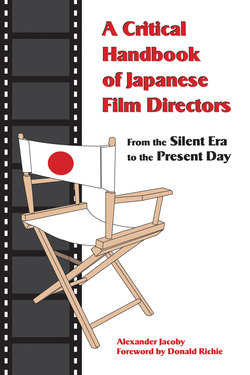Читать книгу A Critical Handbook of Japanese Film Directors - Alexander Jacoby - Страница 26
На сайте Литреса книга снята с продажи.
HASHIGUCHI Ryōsuke
Оглавление(b. July 13, 1962)
橋口亮輔
A subtle dramatist and chronicler of gay subculture in Japan, Hashiguchi won the PIA Film Festival scholarship for his short film, A Secret Evening (Yūbe no himitsu, 1989), and thus was able to fund his first low-budget feature, A Touch of Fever (Hatachi no binetsu, 1993). This bleak yet compassionate story of the lives of teenage hustlers in Tokyo was followed by Like Grains of Sand (Nagisa no Shindobaddo, 1995), an appealingly quirky rites-of-passage movie about a high school boy’s crush on his best friend. Both films were intelligent examinations of the fluidity of youthful sexual identity. Hashiguchi’s next work was Hush (Hasshu, 2001), a melancholy comedy about the triangular relationship between a closeted, thirty-something gay man, his partner, and the unhappy woman who wants him to father her child. Looser and freer in style than his earlier films, it hinted that homosexuality might be liberating in the context of Japan’s restrictive family structures.
Hashiguchi’s work has proved admirable for its depth of characterization and delicacy of approach. He elicits subtle performances from his actors, using an austere technique which employs long takes, often without camera movement, to record details of gesture, posture, and intonation, thereby suggesting depths of feeling and motivation which are not verbally expressed. In consequence, his films paradoxically seem both dispassionate and intimate. His impartial, observant method respects the ambiguities of human behavior, acknowledging the gulfs between people and the impossibility of complete understanding. The viewer’s first impressions of his characters are often misleading: thus, in A Touch of Fever and Like Grains of Sand, the people who initially seem the most assured turn out ultimately to be the most insecure, while Hush deftly charted the shifting balance of power between lovers, friends, and family members.
Hashiguchi’s stories have striven to avoid pat dramatic effects, preferring to mirror the untidiness of real life. The endings of his first two features were remarkably inconclusive, and much of the power of Hush lay in its unpredictable switches between humor and tragedy (as in the sudden death of the protagonist’s brother). Hashiguchi’s non-judgmental sympathy for flawed individuals has made him one of the most engaging Japanese directors of recent years. It is a matter of regret that he has not been more prolific, especially as he seems intent on exploring new territory: at the time of writing, he had just completed his fourth feature, the first to focus primarily on heterosexual characters.
1982 Reberu 7 + α/ Level Seven + Alpha (8mm short)
Sansetto / Sunset (8mm short)
1983 Rara . . . 1981–1983 (8mm shorts)
Fa (8mm short)
1984 Shōnen no kuchibue / A Boy’s Whistle (8mm short)
1985 Hyururu (8mm)
1986 Mirāman hakusho 1986 / Mirrorman’s White Paper 1986 (8mm short)
1989 Yūbe no himitsu / A Secret Evening / The Secret of Last Night (8mm short)
1993 Hatachi no binetsu / A Touch of Fever / Slight Fever of a 19-Year-Old (16mm)
1995 Nagisa no Shindobaddo / Like Grains of Sand
2001 Hasshu! / Hush!
